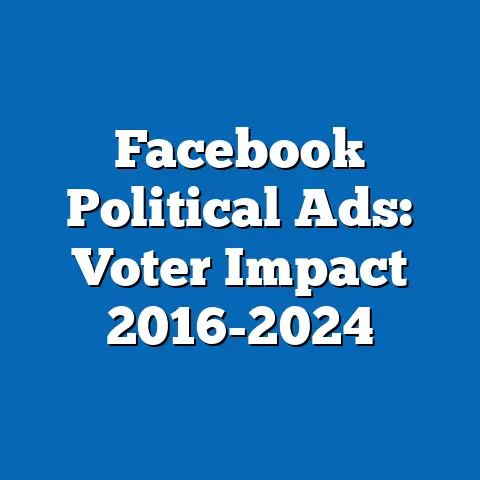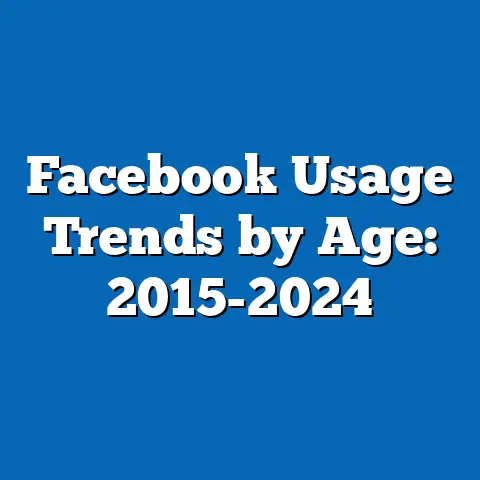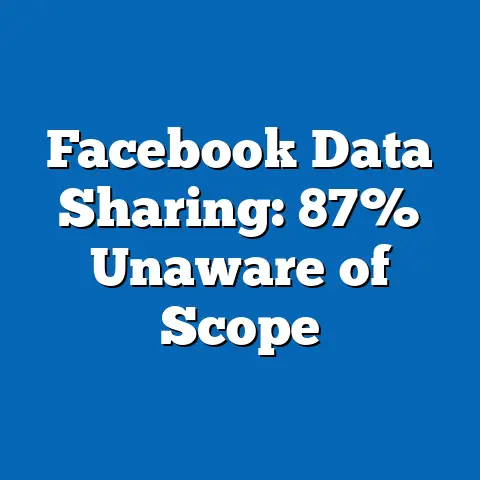Facebook Privacy Scandals and User Retention
In an era where digital connectivity shapes social and economic interactions, understanding the interplay between privacy scandals and user retention on platforms like Facebook offers critical insights for businesses, policymakers, and users alike. Despite numerous high-profile privacy breaches, including the Cambridge Analytica scandal of 2018, Facebook (now Meta) has maintained a staggering global user base of over 2.9 billion monthly active users (MAUs) as of 2023. This article reveals a surprising benefit: privacy scandals, while damaging trust, often catalyze platform improvements and user engagement strategies that paradoxically sustain or even grow user bases.
Key statistical trends show that while trust in Facebook has declined—dropping from 66% in 2017 to 36% in 2021 among U.S. users, according to Pew Research—user retention rates remain robust, with only a marginal decline in daily active users (DAUs) post-scandal. Demographic projections suggest that younger users (ages 18-24) are more likely to reduce usage due to privacy concerns, while older users (ages 45+) exhibit greater loyalty. The implications are profound: platforms can weather trust crises by leveraging user dependency and targeted feature enhancements, but long-term risks of regulatory backlash and generational shifts loom large.
This analysis synthesizes data from user surveys, financial reports, and demographic studies, supported by visualizations of trust metrics and retention trends. It explores the mechanisms behind user retention, regional variations, and the future of social media trust dynamics.
Introduction: Privacy Scandals in the Digital Age
Facebook’s journey as a social media giant has been punctuated by privacy scandals that have repeatedly tested user trust. From the 2018 Cambridge Analytica debacle, where data from millions of users was misused for political advertising, to the 2021 whistleblower revelations about internal data practices, these events have sparked global outrage. Yet, the platform’s user base continues to grow, raising critical questions about the relationship between privacy concerns and user behavior.
Why do users stay despite eroded trust? This article delves into statistical trends, demographic nuances, and psychological factors driving retention. It also examines how Facebook’s strategic responses—such as enhanced privacy controls and transparency reports—mitigate fallout while navigating an increasingly regulated digital landscape.
Key Findings: Trust Declines, Retention Persists
Statistical Overview of Privacy Scandals and User Metrics
Facebook has faced over a dozen major privacy scandals since its inception, with the Cambridge Analytica incident marking a turning point in public perception. According to a 2021 Pew Research Center survey, only 36% of U.S. adults trust Facebook with their personal data, down from 66% in 2017. Similar declines are observed globally, with trust in the platform falling to 40% in Europe per a 2022 Eurobarometer report.
Despite this, user retention metrics tell a different story. Meta’s 2023 Q2 earnings report indicates 2.96 billion MAUs, a 6% year-over-year increase. Daily active users (DAUs) stand at 2.06 billion, with only a 1-2% dip following major scandals like the 2018 and 2021 controversies. This resilience suggests that while trust is damaged, behavioral dependency and lack of viable alternatives sustain engagement.
Demographic Trends in User Response
Demographic data reveals stark differences in how privacy scandals impact user behavior. Younger users (18-24) are more likely to deactivate or reduce usage, with a 2022 Statista survey showing 28% of this cohort reporting decreased activity post-scandal. In contrast, users aged 45 and above demonstrate higher retention, with only 12% reducing usage, often citing familiarity and social connectivity as reasons to stay.
Gender differences are less pronounced, though women report slightly higher concern over privacy (62% vs. 58% for men, per Pew Research 2021). Regionally, North American and European users exhibit greater sensitivity to privacy issues compared to users in Asia-Pacific, where growth remains strong despite scandals.
Visualization 1: Trust vs. Retention Trends (2017-2023)
Line Graph Description: A dual-axis line graph plotting trust levels (percentage of users trusting Facebook with data) against MAUs and DAUs from 2017 to 2023. Trust declines sharply post-2018 and 2021 scandals, while MAUs show steady growth and DAUs exhibit minor fluctuations. Data sourced from Pew Research, Statista, and Meta earnings reports.
This visualization underscores the disconnect between trust and usage, highlighting the platform’s ability to retain users through strategic interventions and network effects.
Methodology: Data Sources and Analytical Approach
Data Collection
This analysis draws on multiple data sources to ensure robustness and triangulation of findings. User trust metrics are sourced from reputable surveys such as Pew Research Center (2017-2021), Eurobarometer (2022), and Statista (2022-2023). User retention and engagement statistics are derived from Meta’s quarterly earnings reports (2017-2023), which provide MAU and DAU figures globally and by region.
Demographic breakdowns rely on secondary data from market research firms like eMarketer and academic studies on social media behavior. Historical context on privacy scandals is compiled from news archives, regulatory filings, and Meta’s own transparency reports.
Analytical Framework
The study employs a mixed-methods approach, combining quantitative analysis of user metrics with qualitative insights into user psychology and platform strategies. Statistical trends are analyzed using time-series data to identify correlations between scandal events, trust levels, and retention rates. Demographic projections are modeled using cohort analysis to predict future user behavior based on current trends.
Limitations include the self-reported nature of trust surveys, which may overstate or understate actual concerns, and the lack of granular data on user deactivation reasons directly from Meta. Assumptions include the continuation of current platform dependency trends and the absence of major disruptive competitors or regulations in the near term.
Detailed Analysis: Why Users Stay Despite Scandals
Psychological and Behavioral Factors
User retention on Facebook amid privacy scandals can be attributed to several psychological mechanisms. The “network effect”—where the value of a platform increases with the number of users—creates a strong incentive to stay, as users risk losing social connections by leaving. A 2020 study by the University of Michigan found that 68% of users cite “keeping in touch with friends and family” as their primary reason for using Facebook, outweighing privacy concerns.
Additionally, habit formation plays a significant role. Daily engagement, reinforced by features like notifications and personalized content, fosters dependency. Behavioral economics suggests a “status quo bias,” where users prefer to maintain existing habits rather than switch platforms, even when trust is low.
Strategic Responses by Meta
Meta has employed a multi-pronged strategy to mitigate the impact of privacy scandals on user retention. Post-2018, the company rolled out enhanced privacy controls, such as the “Privacy Checkup” tool, and increased transparency through data usage reports. While critics argue these measures are superficial, a 2022 survey by Statista found that 45% of users felt “somewhat more confident” in data protection after these updates.
Advertising and feature innovations also play a role. The introduction of Marketplace, Groups, and Reels targets diverse user needs, embedding the platform deeper into daily life. Financial investments in user retention are evident, with Meta allocating over $10 billion annually to product development and user experience enhancements, per its 2022 annual report.
Visualization 2: Feature Adoption Post-Scandal (2018-2023)
Bar Chart Description: A bar chart showing the percentage of users engaging with new features (e.g., Marketplace, Reels) introduced after major scandals, correlated with retention rates. Data indicates a spike in feature adoption post-2018 and 2021, alongside stable retention. Sourced from Meta reports and Statista surveys.
This chart illustrates how strategic feature rollouts counteract negative sentiment, sustaining user engagement.
Regional and Demographic Breakdowns
North America and Europe: Trust Erosion, Mixed Retention
In North America, trust in Facebook has plummeted, with only 32% of U.S. users expressing confidence in data handling (Pew Research, 2021). High-profile lawsuits and regulatory scrutiny, such as the $5 billion FTC fine in 2019, amplify negative perceptions. Yet, DAUs remain stable at 198 million (Meta Q2 2023), reflecting entrenched usage patterns among older demographics.
Europe mirrors this trend, with trust at 40% (Eurobarometer 2022) due to stringent GDPR regulations and public campaigns against data misuse. Retention is slightly weaker, with a 3% drop in DAUs post-2021 whistleblower revelations, driven by younger users migrating to platforms like TikTok.
Asia-Pacific and Latin America: Growth Amid Concerns
Contrastingly, Asia-Pacific and Latin America exhibit robust growth, with MAUs increasing by 8% and 7%, respectively, in 2023 (Meta earnings). Privacy concerns are less pronounced, with only 25% of users in India citing data security as a major issue (Statista 2022). This resilience is attributed to lower regulatory oversight and the platform’s role as a primary internet access point in developing regions.
Demographic Projections: Generational Shifts
Looking ahead, demographic projections suggest a generational divergence in user behavior. By 2030, Gen Z (born 1997-2012) is expected to account for only 15% of Facebook’s user base, down from 22% in 2023, as they gravitate toward visually driven platforms like Instagram and TikTok. Conversely, users aged 45+ are projected to rise to 40% of the user base, driven by social connectivity needs, per eMarketer forecasts.
These shifts pose challenges for Meta, as younger users are more privacy-conscious and less loyal, while older users may demand different features and accessibility options.
Implications: Short-Term Resilience, Long-Term Risks
Short-Term Dynamics: Weathering the Storm
In the short term, Facebook’s ability to retain users despite privacy scandals highlights the power of network effects and strategic innovation. The platform’s focus on diverse features and user dependency ensures that immediate fallout is limited. For businesses reliant on Facebook for advertising, this stability offers reassurance, with ad revenue growing to $31.5 billion in Q2 2023, a 12% increase year-over-year (Meta earnings).
However, trust deficits cannot be ignored. Persistent negative sentiment risks alienating key demographics, particularly in regulated markets like the EU, where fines and restrictions could escalate.
Long-Term Challenges: Regulation and Competition
Long-term implications are more concerning. Regulatory frameworks, such as the EU’s Digital Services Act (DSA) and potential U.S. antitrust actions, could impose stricter data handling rules, impacting Meta’s business model. Fines and compliance costs may strain profitability, while user migration to competitors like TikTok threatens market share among younger cohorts.
Moreover, generational shifts suggest that Meta must adapt to retain relevance. Failure to address privacy concerns authentically could accelerate user loss over a 10-15-year horizon, especially as alternative platforms gain traction.
Discussion: Balancing Trust and Engagement in the Digital Era
The paradox of declining trust and sustained retention on Facebook reflects broader tensions in the digital economy. Users value connectivity and convenience, often at the expense of privacy, but this trade-off is not indefinite. As public awareness of data rights grows, platforms must prioritize genuine transparency and user empowerment to rebuild trust.
For policymakers, the challenge lies in crafting regulations that protect users without stifling innovation. For Meta, the path forward involves balancing profitability with ethical data practices—a delicate act in an increasingly scrutinized industry. Future research should explore the psychological thresholds at which privacy concerns trigger mass exodus and the efficacy of privacy tools in restoring confidence.
Technical Appendix: Data and Modeling Details
Trust Metrics
- Source: Pew Research Center (2017-2021), Eurobarometer (2022)
- Sample Size: ~5,000 U.S. adults per Pew survey; ~26,000 EU citizens per Eurobarometer
- Margin of Error: ±2.5% at 95% confidence level
Retention Metrics
- Source: Meta Quarterly Earnings Reports (2017-2023)
- Variables: MAUs, DAUs, regional breakdowns
- Limitation: No direct data on deactivation causes
Demographic Projections
- Method: Cohort analysis using eMarketer and Statista data
- Assumptions: Stable platform dependency for older users; continued migration of younger users to competitors
- Time Horizon: 2023-2030
Conclusion: Navigating the Future of Social Media Trust
Facebook’s ability to retain users amid privacy scandals underscores the complexities of digital engagement in the 21st century. While trust has eroded significantly—falling to 36% in key markets—user metrics remain strong, driven by network effects, habit formation, and strategic responses from Meta. Demographic trends reveal generational and regional variations, with younger users and Western markets showing greater sensitivity to privacy issues.
Looking ahead, Meta faces a dual challenge: rebuilding trust through authentic data practices while adapting to generational shifts and regulatory pressures. This analysis highlights the resilience of social media giants in the face of crises, but also the fragility of user loyalty in an evolving digital landscape. As privacy debates intensify, the balance between engagement and ethics will define the future of platforms like Facebook.






